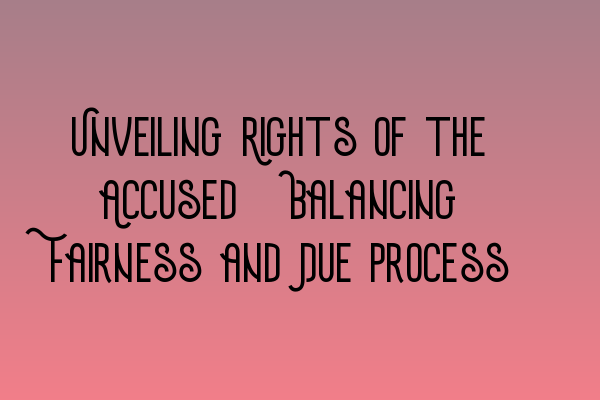Unveiling Rights of the Accused: Balancing Fairness and Due Process
Being accused of a crime is an incredibly daunting experience. The legal process is complex, and the stakes are high. It is essential for individuals facing criminal charges to have a thorough understanding of their rights and the principles of fairness and due process that underpin our criminal justice system. In this article, we will delve into the rights of the accused and the delicate balance that must be struck to ensure a fair trial.
The Presumption of Innocence
The cornerstone of the legal system is the presumption of innocence. Every individual is considered innocent until proven guilty beyond a reasonable doubt. This fundamental principle protects individuals from arbitrary detention and ensures that the burden of proof lies with the prosecution.
However, the presumption of innocence does not mean that the accused is immune from investigation or prosecution. It simply means that the burden of proof rests on the prosecution to establish the accused’s guilt. It is crucial for the accused to have access to legal representation and to exercise their right to remain silent to avoid self-incrimination.
The Right to a Fair Trial
A fair trial is the bedrock of a just legal system. It guarantees that both sides have an opportunity to present their case and that decisions are made based on evidence and legal principles rather than bias or prejudice. The right to a fair trial includes the right to a competent legal counsel, the right to cross-examine witnesses, and the right to present a defense.
One key aspect of a fair trial is the right to be informed of the charges and evidence against you. This allows the accused to prepare an effective defense and challenge the prosecution’s case. It is also essential to address any potential conflicts of interest and ensure that the trial is conducted in an impartial manner.
The Role of Legal Professionals
Legal professionals, such as solicitors and barristers, play a vital role in upholding the rights of the accused. They provide expert advice and representation, ensuring that their clients’ rights are protected throughout the legal process. By understanding the complexities of criminal law, these professionals can navigate through the intricacies of the legal system to secure a fair outcome for their clients.
If you are interested in expanding your expertise in criminal practice, consider attending our Workshops and Seminars on Criminal Practice. These events provide valuable insights and practical knowledge that can enhance your criminal law skills.
Additionally, joining an SQE Criminal Law study group can greatly enhance your learning experience. Check out our article on Enhancing Your SQE Criminal Law Study Group Experience to discover how you can maximize the benefits of studying with peers.
Conclusion
Fairness and due process are critical components of the criminal justice system. The rights of the accused must be carefully balanced to ensure a just trial. By understanding these rights and seeking qualified legal representation, individuals can navigate the complexities of criminal proceedings and protect their interests.
If you would like to learn more about criminal law and important topics such as criminal evidence rules, public prosecutions, and police procedures in the UK, we invite you to explore our related articles:
- Decoding Criminal Evidence Rules: A Detailed Analysis
- Public Prosecutions in the UK: A Closer Look at State Prosecution
- Inside Look: Uncovering UK Police Procedures in Criminal Cases
